In pictures: The carnival that wasn't
- Published

Rio's Sambadrome would normally be packed at this time of year
The days leading up to Ash Wednesday are normally a riot of music and colour in Rio de Janeiro, the city which hosts one of the world's most famous carnival celebrations.
But with Brazil ravaged by the coronavirus pandemic - the country has the second highest number of Covid deaths in the world - carnival, like so many other things, had to be put on hold.
The gates are remaining shut and there will be no parades
It was not an easy decision to postpone the centuries-old tradition. The first records of carnival festivities being held in Rio date back to 1723.
The last time it was postponed was in 1912 when José Paranhos, hailed as "the father of Brazilian diplomacy", died a week before the festival.
The government at the time decided to postpone carnival until April and 20,000 people turned out instead to watch Paranhos's funeral cortege.
The highlight of Rio's annual carnival celebrations is the parade in the Sambadrome, where samba schools compete to be crowned carnival champions.
These stands would normally be packed with revellers
But this year the huge concrete arena lies deserted under a scorching sun except for the lonely figure of Darllan Nascimento.
Darllan Nascimento is part of the Salgueiro samba school
Mr Nascimento has built his career of 14 years around carnival and the samba schools at the heart of it.
He is currently the director of the drum section at Salgueiro, one of the most prestigious samba schools in Rio.
The costume he is wearing is from last year's parade, in which Salgueiro told the story of Benjamin de Oliveira, the first black clown in Brazil. Carnival is at the core of black culture in Brazil.
The samba schools aim to tell stories through their music and costumes
Mr Nascimento is shocked at how much of a void the lack of festivities has left.
"Even those who don't have work ties to carnival are feeling the difference," he says. "They would come and watch the parade, it does feel a bit like we were deprived of it this year."
As well as leading the drum section at Salgueiro, Mr Nascimento also is the conductor for percussion at a smaller samba school, Unidos de Manguinhos.
He says that it is these smaller schools which have been particularly badly hit by the pandemic. "More often than not these cultural projects are underfunded and only survive through the love and dedication of managers and the community they serve."
And it is not just those who take part in the parades who have been affected.
Claudeci Gonçalves owns Mercadinho Estação, a tiny shop attached to the Sambadrome. He has worked here for the past 20 years and is shaken by the area's eerie emptiness.
Claudeci Gonçalves hopes the good times will return
"On a normal carnival day, the area surrounding the Sambadrome would be packed with street vendors, there would be work for everyone!
Streets and shops would have been packed in a normal year
The pandemic has been very difficult for us," he says, adding that some of his relatives contracted coronavirus but luckily recovered.
In central Rio, Chico, the owner of Babado da Folia, one of the most popular stores for costume supplies and accessories, is also feeling the strain. "It has been difficult for all of us working with events supply," he says.
Suppliers of costumes and carnival accessories have been badly hit
"I had to let go of some of my employees, unfortunately," Chico explains. But he says he understands why carnival and other traditional festivities have been cancelled. "There are too many people dying, we need to be cautious."
José Castro is a long-time employee who has managed to hold on to his job. "I've always worked around carnival, helping make the costumes," he says.
José Castro misses the buzz in the shop and on the streets
"I even paraded on the floats with some of the samba schools. It's really sad to see it like this."
Arthenia, who manages Babado, says they are lucky because they do not rely solely on carnival revellers for their sales but also market their goods to followers of Afro-Brazilian religions. "Although carnival is the peak of our sales, we have survived so far because we also rely on that other market."
With carnival postponed, there has not been much demand for beads
Away from the city centre, in the south of Rio, the city's famous Ipanema and Copacabana beaches are also almost empty except for a few locals and some Brazilian tourists.
Morro Dois Irmãos looms over an empty beach
Under the shadow of the Morro Dois Irmãos (Two Brothers mountain) and the Copacabana Palace, street vendors, who rely on the carnival season for their sales, struggle to make a living.
"At this hour, this street would have been filled with people. Of course, we always sell more during carnival," one of them says.
Sales have been slow on the beaches as well
Despite the challenges facing the vendors and all those whose jobs depend on the annual carnival season, most said that they understood the reasons behind the restrictions. "We need to do it [the lockdown]. It can't go on like this," one of the vendors says.
With a vaccination programme under way in Rio, they said they were optimistic that next year's carnival would again see the streets filled with revellers in colourful costumes to celebrate one of the world's biggest street parties and a quintessential expression of Brazilian culture.
All pictures subject to copyright.
Related Topics
- Published25 September 2020